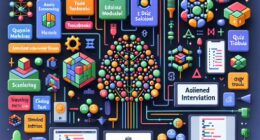The Revolutionary Impact of Machine Learning on Data Analytics
In the ever-evolving tech sphere, machine learning (ML) has become a vital tool for advanced data analytics, propelling industries toward unprecedented efficiency, innovation, and a competitive edge. This paradigm shift has seen algorithms turn data into foresight and patterns into decisions, setting the stage for a future where the algorithmic prediction informs every business move.
Decoding Machine Learning’s Role
Machine learning, a subset of artificial intelligence (AI), redefines programming through algorithms that enable computers to learn from data and make decisions autonomously. This departure from traditional programming, which relies on hard-coded instructions, enables ML systems to recognize patterns and improve with minimal human oversight. It’s this capacity for self-improvement that renders machine learning ideal for sifting through and making sense of extensive datasets.
Enhancing Data Analytics with Machine Learning
At its core, data analytics is about decrypting datasets to reveal underlying patterns, correlations, and insights. Machine learning elevates this process, automating the analysis and generating insights that are both actionable and accurate. Let’s delve into some of the ways machine learning redefines data analytics:
- Predictive Analytics: By studying past data, ML algorithms can predict future patterns, such as consumer behavior or market trends. Retailers, for instance, employ these predictions to streamline inventory planning or personalize customer recommendations.
- Classification and Regression: These models either categorize data or forecast numerical values, playing pivotal roles in various sectors. Healthcare, for example, benefits from algorithms that can diagnose diseases or predict patient recovery outcomes.
- Clustering and Segmentation: This technique groups data points with similar traits, aiding in market segmentation or anomaly detection, which, in turn, fuels targeted marketing strategies and enhances customer engagement.
- Anomaly Detection: Machine learning excels in spotting outliers, a capability crucial for fraud prevention, network security, and quality control across numerous industries.
- Natural Language Processing (NLP): As a ML discipline, NLP interprets human language, powering advancements in chatbots, sentiment analysis, and language translation to revolutionize customer interactions.
Transformative Applications Across Industries
The ubiquity of machine learning in data analytics spans an array of sectors:
- Healthcare: From diagnostics to treatment customization, machine learning models offer groundbreaking advances in medical predictions and patient care.
- Finance: Machine learning streamlines transactions by detecting fraud, enabling algorithmic trading, and enhancing risk management.
- Retail: In retail, ML algorithms underpin personalized marketing, dynamic inventory management, and superior customer service experiences.
- Manufacturing: The manufacturing industry applies machine learning for predictive maintenance, quality control, and optimizing supply chains, significantly improving efficiency and reducing operational costs.
- Transportation: Machine learning improves route planning, predicts demand for services like ride-sharing, and is a cornerstone of developing autonomous vehicle technology.
- Marketing and Advertising: Machine learning enables companies to target advertisements more effectively, conduct detailed customer segmentation, and gauge brand perception through sentiment analysis.
The Advantages of Integrating Machine Learning
The fusion of machine learning with data analytics brings a plethora of benefits, including heightened accuracy and productivity, scalability, automation, personalization, and the ability to anticipate market movements. However, challenges such as ensuring data quality, selecting appropriate algorithms, interpreting model decisions, and upholding data privacy and security, demand attention to fully leverage machine learning’s potential.
Looking Ahead: The Future of Machine Reading in Data Analytics
As we peer into the future of data analytics, machine learning continues to be a beacon of innovation, with developments like edge computing, explainable AI, Automated Machine Learning (AutoML), federated learning, and blockchain integration promising to further its impact. These advancements not only streamline machine learning’s incorporation into analytics but also ensure the technology’s growth is sustainable, transparent, and secure.
The integration of machine learning in data analytics is not just a trend; it’s a fundamental shift in how we process and leverage data. As businesses and industries adapt to this digital age, the potential for innovation, efficiency, and competitive advantage through machine learning is boundless. The journey of exploring machine learning’s capabilities in enhancing data analytics is only the beginning, promising a future where data-driven decisions propel businesses to new heights.










